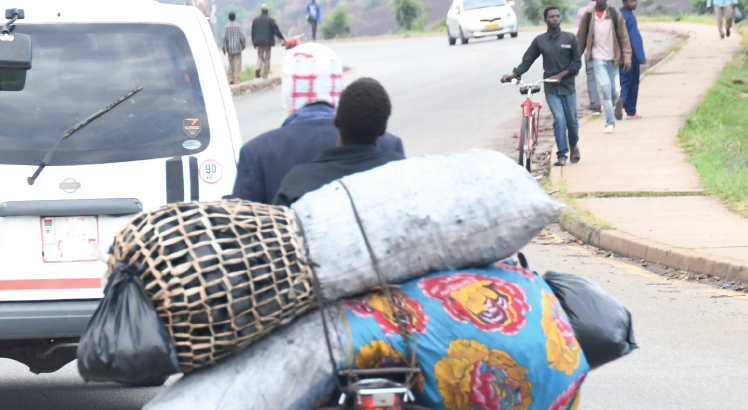Kabaza raid!
In a desperate bid to restore sanity amid rising road accidents attributed to motorcycle taxis locally called kabaza, road traffic authorities have launched an operation to rid the country’s roads of unroadworthy motorcycles.
The joint operation by Malawi Police Service and Directorate of Road Traffic and Safety Services yesterday saw about 38 motorcycle taxis impounded.
To be back on the road, the owners are expected to comply with road traffic regulations by having their motorcycles registered, insured and their operators should have valid rider’s licences.
Spot-checks showed that the availability of the kabaza motorbikes in the Blantyre central business district area was minimal around midday yesterday.
South West Police Region spokesperson Joseph Sauka in an interview yesterday said the operation follows the ever -increasing number of road accidents involving motorcycle taxis nationwide.

He said the joint operation aims at reducing motorcycle-related accidents in the country.
Said Sauka: “We have noted that most motorists fall victim in most motorcycle accidents or thefts. Through this operation, we want all motorcycles to be registered and have insurance and that cyclists should have at least a motorcycle licence.
“We want to protect their [motorcycle riders’] lives because most of the accidents occur due to cyclists’ lack of knowledge on how to use the road. This joint operation is an ongoing exercise.”
In a separate interview, Road Traffic spokesperson Angelina Makwecha said the operation started sometime back in all the cities and towns. However, she could not disclose how many motorcycles have been impounded to date.
“It’s not like we want to punish them, but we want to ensure that cyclists’ lives and their passengers are protected. Most of these road accidents are avoidable. So we will continue with the operation,” she said.
Registration for a motorcycle is currently pegged at about K25 000.
In recent years, it has become common to see motorcycle taxi operators freely roaming the country’s roads without crash helmets and sometimes overloaded in full view of traffic police. In Blantyre central business district, the kabaza operators also ignore one-way traffic flow regulations at will.
Further, the motorcycles bear no registration plates, a situation some criminals have capitalised on to pounce on unsuspecting motorists, especially at night.
In Parliament two weeks ago, Chiradzulu West legislator Mathews Ngwale presented a motion seeking a resolution to resolve that government should come up with legislation to regulate the kabaza business and restore sanity.
And in March this year, an analysis by our sister newspaper Nation on Sunday showed that between 2019 and 2022, the motorcycle taxis killed 1 700 people and injured 1 860. In 2020 alone, 860 people were killed in kabaza-related accidents, a figure which went down in 2021 (144) and 2022 (109), according to Nation on Sunday analysis.
Commenting on the operation, road safety specialist Chifwede Hara commended road traffic authorities, saying the joint exercise will help to reduce motorcycle-related road accidents.
He said most motorcycle taxi operators ride unroadworthy motorcycles which pose a danger to both themselves and other road users.
“I urge police and the directorate not to be tired because it’s not an easy job, but it is doable. We want sanity on our roads,” said Hara.
Statistics from the directorate and corroborated by police indicate that motorcycle taxis have over the years turned into risky rides with accidents increasing by about 1 700 percent between 2014 and 2022.
Meanwhile, findings of a study show that 70 percent of the owners of motorcycle taxis in the country’s four cities are working-class, mostly from police and Malawi Defence Force.
The study, commissioned by United Kingdom-funded non-governmental organisation Traction, established that only 30 percent of kabaza motorcycles are owned by operators themselves.





